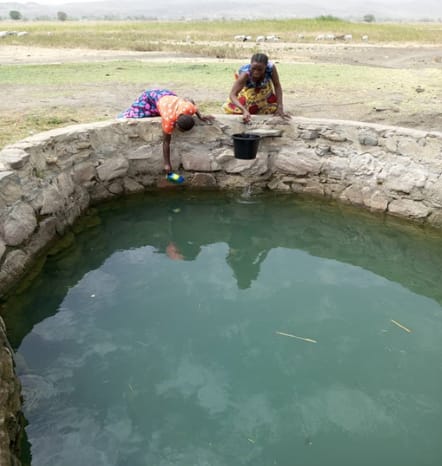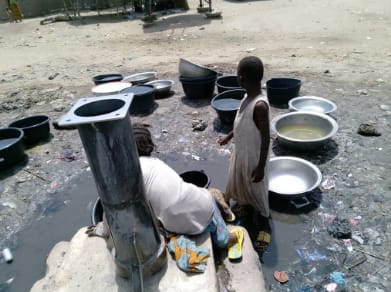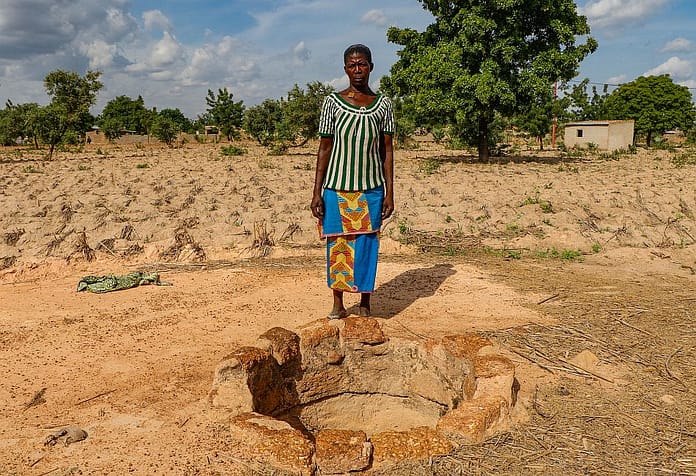Andrew Okem, Charity Osei-Amponsah and Tafida Ahmadu
People displaced by conflict, particularly women, girls and children, experience significant obstacles in accessing sufficient water and sanitary facilities. Long travel distances for water collection expose them to safety risks like harassment and snake bites, while inadequate infrastructure exacerbates water shortages and contamination. When these water sources are disrupted there is loss of livelihoods, and tensions with host communities occasionally turn violent. These realities are being experienced in Nigeria’s Adamawa State, where more than 23,000 internally displaced persons (IDPs) have taken up residence in 12 local government areas due to the activities of non-state armed groups and communal clashes.
In Adamawa State, conflict has drastically changed traditional gender roles inside IDP households. Before displacement, gender roles in the rural, mostly Muslim parts of Northeast Nigeria were historically inflexible. Women’s roles were mostly focused on reproductive duties, such as cooking for the family and taking care of other household chores. Certain women adhered to strict rules of modesty and spent practically all of their time indoors, either in walled family compounds or conservative settlements. Male headed families had the exclusive responsibility for providing the financial necessities of the family, leaving women completely dependent on their male relatives/partners for survival. Due to disruptions in conventional community structures (e.g., women assuming the household provider role), gender roles are no longer restricted. Both men and women struggle to adjust to the shift in roles.

The shift in productive and reproductive roles
The threat of kidnapping and violence is a reality for every resident of Adamawa State. However, more men than women are kidnapped and/or killed by non-state armed groups or forced to join up. As a result, many women have become de facto heads of households and assumed the responsibilities for the provision of food and water, in addition to the traditional role of caring for family members. The old limitations and protections for women are gone, requiring adaptability to new realities even as displacement exposes them to greater dangers.

As heads of households, displaced widows face immense responsibility to secure basic provisions for their families, often with minimal support. In camps across Adamawa like Daware, Anguwan Tula and Malkohi, women struggle to provide sufficient food, clean water and healthcare for their children and relatives. In the past, women depended on male family members and community ties. Conflict has fractured these critical support systems, leaving women isolated as they navigate unfamiliar duties. As women and girls assume more prominent positions in the economy in addition to caring for their families, men grapple with perceived threats from shifting gender norms. The result of this shifting landscape is gaps in livelihood opportunities, as well as access to food, water and healthcare for both men and women, with women experiencing higher levels of vulnerability. The way the roles, norms and values of the society are evolving necessitates a closer examination of the emerging circumstances faced by Nigeria’s internally displaced people.
As more equitable sharing of productive and reproductive roles emerges between women and men, tensions flare among couples. Male IDPs can no longer rely on social networks to function as primary caregivers and leaders of households. As noted by some IDP leaders, even securing necessities like water access for the family may now spark marital disputes as women take on non-traditional responsibilities. According to an IDP leader, “water scarcity has caused a serious rift among married couples, which required mediation in some instances. This is because, traditionally, married women don’t fetch water. Rather, it is the responsibility of husbands to provide it. However, because of displacement at the hands of the Boko-Haram insurgency, roles have changed. Women now participate in fetching water, while the men go to farms, trade or do menial jobs to make ends meet. But some women have not accepted this responsibility wholeheartedly”. Men deal with distress and shame at being unable to serve reliably as socially accepted breadwinners and household heads. The collapse of customary masculine roles further strains the mental health of IDP men.
Accessing water during displacement
The intersection of gender with other identity factors, such as ethnicity, profoundly shapes displaced groups’ experiences of water system vulnerabilities in northeast Nigeria. For instance, ethnic tensions between IDPs and host communities occasionally erupt into violence, like in Daware where an IDP was killed over water conflicts. A community leader recounted how “one IDP youth was murdered because of conflict between IDPs and natives over water access. The situation has worsened the relationship between the two communities in the area. The cause of the conflict was because the natives don’t feel they have equal rights to water access with the IDPs. Hence, the natives don’t join queues to access water, and most IDPs tend to resist this action, because they feel everyone should join the queues”. Lack of access to water affects religious practices, as in Malkohi where shortages forced Muslims to resort to using dust for ablution (Taimama), a type of ritual purification, before prayers. According to a female IDP, “water scarcity on several occasions, has forced them to use dust for ablution (Taimama) before prayers, which is one of the most extreme water scarcity situations a Muslim could ever experience”. The socioeconomic status of IDPs can further exacerbate water scarcity issues, with only financially better-off IDPs able to afford the expensive cost of water in places like Rumde Baru.

Gender remains a recurring factor in the vulnerabilities experienced by IDPs, as illustrated by women’s risks incurred through their new responsibility for water collection. Adamawa State is a complex mosaic of identity factors, centrally shaped by gender dynamics which governs displaced groups’ access, roles and experiences with inadequate water resources.
With conflict in Northeast Nigeria catalyzing a dramatic shift in gender roles and relations for internally displaced persons traditional community ties and protections being stripped away, women and men are left exposed and struggling to fulfil unfamiliar responsibilities. In the context of transforming gender roles, women disproportionately bear the burden as heads of households and providers without adequate infrastructure or support. The new realities require coordinated responses prioritizing the safety and dignity of women and girls as they navigate the emerging roles amidst amplified risks. Only with an understanding of changing dynamics can policymakers implement long-term solutions to empower IDPs with autonomy and hope for the future.

Acknowledgements
This blog discusses IWMI’s work in Nigeria as part of the CGIAR Initiative on Fragility, Conflict, and Migration which receives funding from the Gender Impact Platform.



